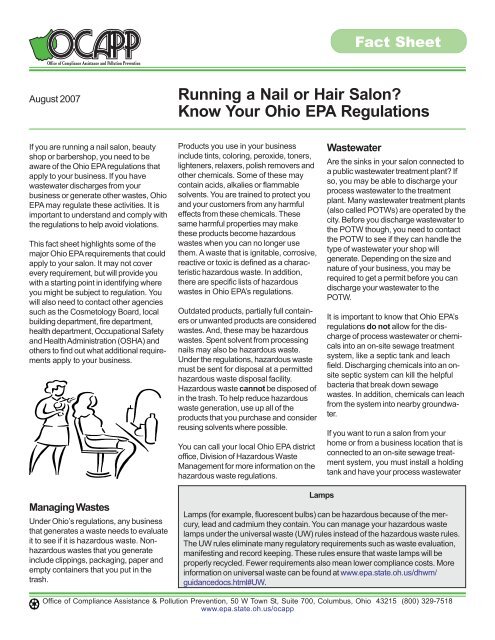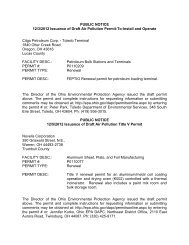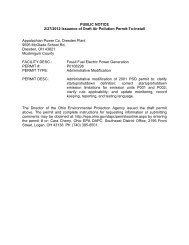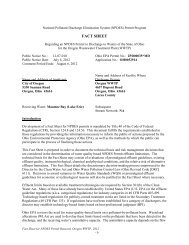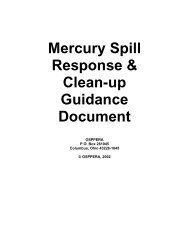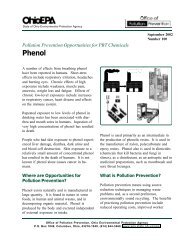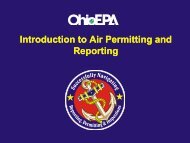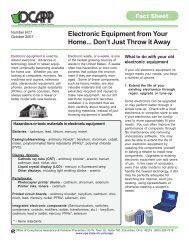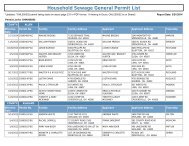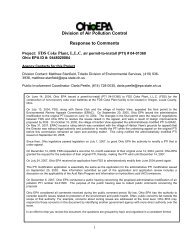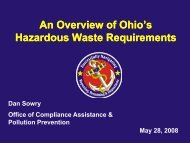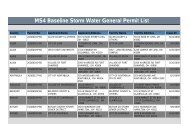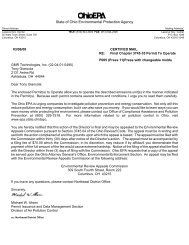Running a Nail or Hair Salon? - Ohio EPA
Running a Nail or Hair Salon? - Ohio EPA
Running a Nail or Hair Salon? - Ohio EPA
You also want an ePaper? Increase the reach of your titles
YUMPU automatically turns print PDFs into web optimized ePapers that Google loves.
Fact Sheet<br />
August 2007<br />
<strong>Running</strong> a <strong>Nail</strong> <strong>or</strong> <strong>Hair</strong> <strong>Salon</strong><br />
Know Your <strong>Ohio</strong> <strong>EPA</strong> Regulations<br />
If you are running a nail salon, beauty<br />
shop <strong>or</strong> barbershop, you need to be<br />
aware of the <strong>Ohio</strong> <strong>EPA</strong> regulations that<br />
apply to your business. If you have<br />
wastewater discharges from your<br />
business <strong>or</strong> generate other wastes, <strong>Ohio</strong><br />
<strong>EPA</strong> may regulate these activities. It is<br />
imp<strong>or</strong>tant to understand and comply with<br />
the regulations to help avoid violations.<br />
This fact sheet highlights some of the<br />
maj<strong>or</strong> <strong>Ohio</strong> <strong>EPA</strong> requirements that could<br />
apply to your salon. It may not cover<br />
every requirement, but will provide you<br />
with a starting point in identifying where<br />
you might be subject to regulation. You<br />
will also need to contact other agencies<br />
such as the Cosmetology Board, local<br />
building department, fire department,<br />
health department, Occupational Safety<br />
and Health Administration (OSHA) and<br />
others to find out what additional requirements<br />
apply to your business.<br />
Products you use in your business<br />
include tints, col<strong>or</strong>ing, peroxide, toners,<br />
lighteners, relaxers, polish removers and<br />
other chemicals. Some of these may<br />
contain acids, alkalies <strong>or</strong> flammable<br />
solvents. You are trained to protect you<br />
and your customers from any harmful<br />
effects from these chemicals. These<br />
same harmful properties may make<br />
these products become hazardous<br />
wastes when you can no longer use<br />
them. A waste that is ignitable, c<strong>or</strong>rosive,<br />
reactive <strong>or</strong> toxic is defined as a characteristic<br />
hazardous waste. In addition,<br />
there are specific lists of hazardous<br />
wastes in <strong>Ohio</strong> <strong>EPA</strong>’s regulations.<br />
Outdated products, partially full containers<br />
<strong>or</strong> unwanted products are considered<br />
wastes. And, these may be hazardous<br />
wastes. Spent solvent from processing<br />
nails may also be hazardous waste.<br />
Under the regulations, hazardous waste<br />
must be sent f<strong>or</strong> disposal at a permitted<br />
hazardous waste disposal facility.<br />
Hazardous waste cannot be disposed of<br />
in the trash. To help reduce hazardous<br />
waste generation, use up all of the<br />
products that you purchase and consider<br />
reusing solvents where possible.<br />
You can call your local <strong>Ohio</strong> <strong>EPA</strong> district<br />
office, Division of Hazardous Waste<br />
Management f<strong>or</strong> m<strong>or</strong>e inf<strong>or</strong>mation on the<br />
hazardous waste regulations.<br />
Wastewater<br />
Are the sinks in your salon connected to<br />
a public wastewater treatment plant If<br />
so, you may be able to discharge your<br />
process wastewater to the treatment<br />
plant. Many wastewater treatment plants<br />
(also called POTWs) are operated by the<br />
city. Bef<strong>or</strong>e you discharge wastewater to<br />
the POTW though, you need to contact<br />
the POTW to see if they can handle the<br />
type of wastewater your shop will<br />
generate. Depending on the size and<br />
nature of your business, you may be<br />
required to get a permit bef<strong>or</strong>e you can<br />
discharge your wastewater to the<br />
POTW.<br />
It is imp<strong>or</strong>tant to know that <strong>Ohio</strong> <strong>EPA</strong>’s<br />
regulations do not allow f<strong>or</strong> the discharge<br />
of process wastewater <strong>or</strong> chemicals<br />
into an on-site sewage treatment<br />
system, like a septic tank and leach<br />
field. Discharging chemicals into an onsite<br />
septic system can kill the helpful<br />
bacteria that break down sewage<br />
wastes. In addition, chemicals can leach<br />
from the system into nearby groundwater.<br />
If you want to run a salon from your<br />
home <strong>or</strong> from a business location that is<br />
connected to an on-site sewage treatment<br />
system, you must install a holding<br />
tank and have your process wastewater<br />
Managing Wastes<br />
Under <strong>Ohio</strong>’s regulations, any business<br />
that generates a waste needs to evaluate<br />
it to see if it is hazardous waste. Nonhazardous<br />
wastes that you generate<br />
include clippings, packaging, paper and<br />
empty containers that you put in the<br />
trash.<br />
Lamps<br />
Lamps (f<strong>or</strong> example, flu<strong>or</strong>escent bulbs) can be hazardous because of the mercury,<br />
lead and cadmium they contain. You can manage your hazardous waste<br />
lamps under the universal waste (UW) rules instead of the hazardous waste rules.<br />
The UW rules eliminate many regulat<strong>or</strong>y requirements such as waste evaluation,<br />
manifesting and rec<strong>or</strong>d keeping. These rules ensure that waste lamps will be<br />
properly recycled. Fewer requirements also mean lower compliance costs. M<strong>or</strong>e<br />
inf<strong>or</strong>mation on universal waste can be found at www.epa.state.oh.us/dhwm/<br />
guidancedocs.html#UW.<br />
Office of Compliance Assistance & Pollution Prevention, 50 W Town St, Suite 700, Columbus, <strong>Ohio</strong> 43215 (800) 329-7518<br />
www.epa.state.oh.us/ocapp
<strong>Running</strong> a <strong>Nail</strong> <strong>or</strong> <strong>Hair</strong> <strong>Salon</strong> Know Your <strong>Ohio</strong> <strong>EPA</strong> Regulations<br />
hauled off-site f<strong>or</strong> disposal. A holding<br />
tank requires a permit-to-install (PTI)<br />
from <strong>Ohio</strong> <strong>EPA</strong>’s Division of Surface<br />
Water. The PTI must be prepared by a<br />
professional engineer.<br />
You can contact your local <strong>Ohio</strong> <strong>EPA</strong><br />
district office, Division of Surface Water<br />
f<strong>or</strong> m<strong>or</strong>e inf<strong>or</strong>mation on the wastewater<br />
discharge and permitting requirements.<br />
You can contact your local water <strong>or</strong><br />
utilities department to get contact<br />
inf<strong>or</strong>mation f<strong>or</strong> your POTW.<br />
Drinking Water<br />
If your business has its own well that<br />
supplies water f<strong>or</strong> drinking, cooking,<br />
washing hands, washing dishes, <strong>or</strong><br />
bathing, it may meet <strong>Ohio</strong> <strong>EPA</strong>’s<br />
definition of a public water system. A<br />
public water system is one that has at<br />
least 15 service connections <strong>or</strong> regularly<br />
provides water to 25 <strong>or</strong> m<strong>or</strong>e people f<strong>or</strong><br />
60 <strong>or</strong> m<strong>or</strong>e days a year. Under these<br />
regulations, you must submit plans f<strong>or</strong><br />
installing <strong>or</strong> changing a well. In addition,<br />
well systems must be tested periodically<br />
and the test results rep<strong>or</strong>ted to <strong>Ohio</strong><br />
<strong>EPA</strong>. Contact your local <strong>Ohio</strong> <strong>EPA</strong><br />
district office, Division of Drinking &<br />
Ground Waters f<strong>or</strong> m<strong>or</strong>e inf<strong>or</strong>mation on<br />
well system requirements.<br />
Need Additional Help<br />
If you have questions <strong>or</strong> need help in<br />
understanding <strong>Ohio</strong> <strong>EPA</strong>’s regulations,<br />
you can contact <strong>Ohio</strong> <strong>EPA</strong>’s Office of<br />
Compliance Assistance and Pollution<br />
Prevention (OCAPP) f<strong>or</strong> help. OCAPP is<br />
a non-regulat<strong>or</strong>y office of <strong>Ohio</strong> <strong>EPA</strong> with<br />
a goal of helping small businesses<br />
comply with environmental regulations<br />
and permitting requirements. If you are<br />
operating a small business with fewer<br />
than 100 employees, we can help you!<br />
F<strong>or</strong> m<strong>or</strong>e inf<strong>or</strong>mation, contact OCAPP at<br />
(800) 329-7518, <strong>or</strong> visit our Web site at<br />
www.epa.state.oh.us/ocapp/sb.<br />
CDO<br />
NEDO<br />
District Offices<br />
Central District Office<br />
50 W. Town St. Suite 700<br />
Columbus, OH 43215<br />
(614) 728-3778<br />
N<strong>or</strong>theast District Office<br />
2110 E. Auroa Rd.<br />
Twinsburg, OH 44087<br />
(330) 963-1200<br />
NWDO N<strong>or</strong>thwest District Office<br />
347 N. Dunbridge Rd.<br />
Bowling Green, OH 43402<br />
(419) 352-8461<br />
SEDO<br />
Southeast District Office<br />
2195 Front St.<br />
Logan, OH 43138<br />
(740) 385-8501<br />
SWDO Southwest District Office<br />
401 E. Fifth St.<br />
Dayton, OH 45402-6357<br />
(937) 285-6357<br />
2 <strong>Ohio</strong> <strong>EPA</strong> is an Equal Opp<strong>or</strong>tunity Employer


